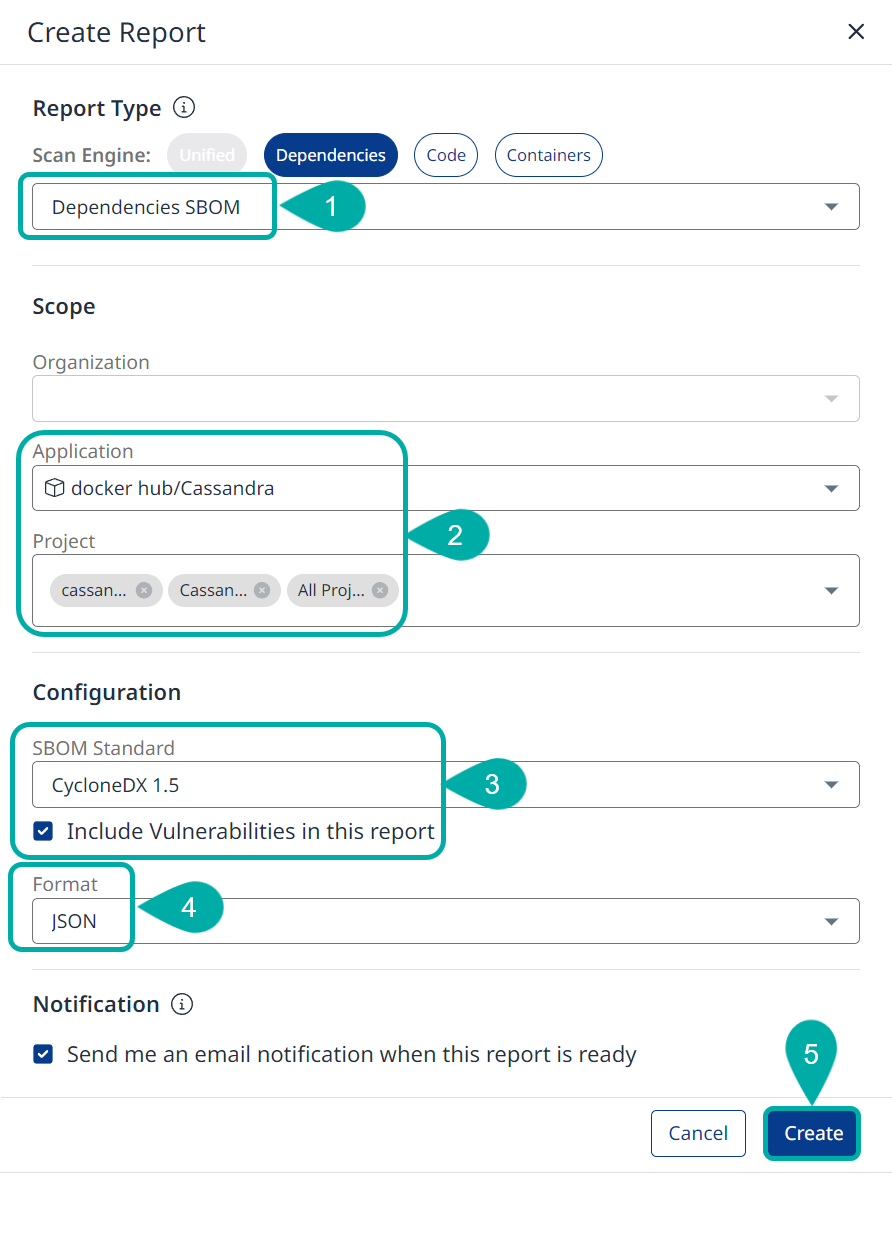The Dependencies SBOM Report
Overview
The Mend Platform enables you to generate and export a Software Bill of Materials (SBOM) report, that specifies the libraries, code packages, and other third-party components that are used in your applications.
Getting it done
Create a Dependencies SBOM report in the Mend Platform
From the Mend Platform menu bar, select Reports > Create > Dependencies SBOM Export.
This will lead you to the Dependencies SBOM report screen, where you are requested to specify the following details:The scope for which to create the SBOM report: Organization/Application/Project(s).
The desired SBOM standard (SPDX 2.2 / SPDX 2.3 / CycloneDX 1.4 / CycloneDX 1.5).
The desired report’s file format. The “Include Vulnerabilities in this report” checkbox allows you to include/exclude vulnerabilities from the report.
Click the ‘Create’ button to generate the selected report.

The report is generated asynchronously and once it is ready, it will be available in the main Reports page.
Download
At this stage, the report will be added to the list of reports in the main Reports page, allowing you to download it by clicking the More Options button (vertical ellipsis) at the right edge of the screen and then ‘Download’:

Create a Project out of a Dependencies SBOM Report file
You can upload a previously downloaded Dependencies SBOM report to the Mend Platform, to create a new project.
Information on how to accomplish this can be found here.
Reference
Supported Standards and File Formats
Mend offers the following SBOM Standards in the supported formats:
SPDX 2.2 / SPDX 2.3:
JSON
XML
YAML
EXCEL
TV
CycloneDX 1.4* / CycloneDX 1.5* / CycloneDX 1.6*:
JSON
XML
Note:
The CycloneDX standard is embedded with Vulnerability Exploitability eXchange (VEX) data
For CycloneDX 1.6, only semantic support is available.
CBOM, CDXA, AI/ML, and AI/ML are not supported.
Mend SBOM Reports Include PURL data
A purl (or package URL for short) is a format used to describe and identify software packages in a standardized way. It provides a uniform structure for specifying package metadata, making it easier to manage and reference software packages across different repositories, platforms, and tools. For example, purl data for the Maven package oro-2.0.8.jar will look like this in Mend's SBOM report:
"externalRefs" : [ {
"referenceCategory" : "PACKAGE-MANAGER",
"referenceLocator" : "pkg:maven/oro/oro@2.0.8?type=jar",
"referenceType" : "purl"
} ]VEX Data in the CycloneDX Dependencies SBOM report
Status Mapping
Finding Status | Additional Considerations / Comments | VEX Example |
|---|---|---|
Open Finding | The code is reachable. If a fix is available, |
CODE
|
Open Finding | A Jira issue was created for this finding |
CODE
|
| The code is unreachable |
CODE
|
Suppressed Finding + “Not Affected” status | The code is reachable or no reachability information is available |
CODE
|
Suppressed Finding + “Acceptable risk” status or “No time to fix” or “Other”. | If fix is available add |
CODE
|
Suppressed Finding + “No available fix” status |
|
CODE
|
Differences Between SPDX and CycloneDX in the Mend AppSec Platform
It’s important to note that the handling of vulnerabilities differs between CycloneDX and SPDX, mainly because VEX is only supported in CycloneDX.
Vulnerability Suppression
In SPDX, a suppressed vulnerability will be completely hidden.
In CycloneDX, a suppressed vulnerability will remain visible albeit with the relevant VEX status.
